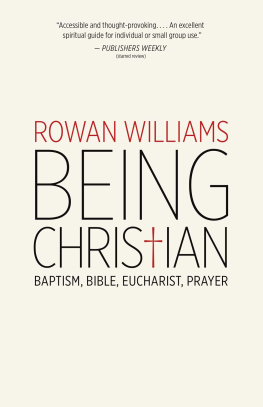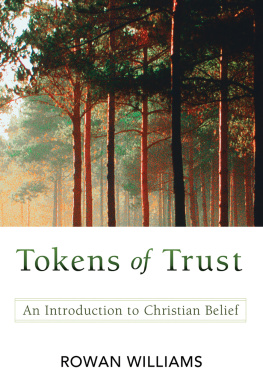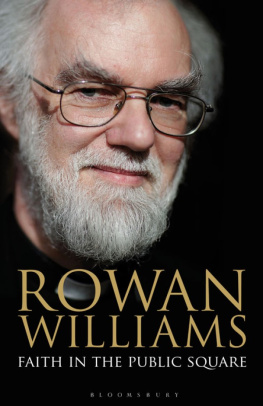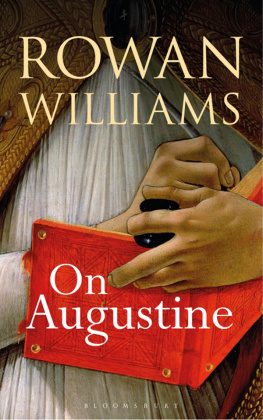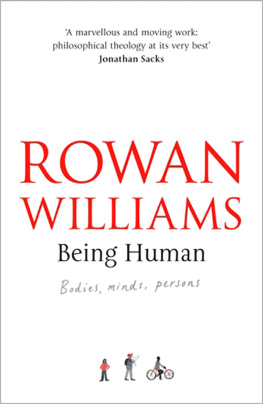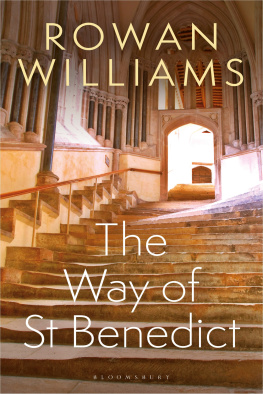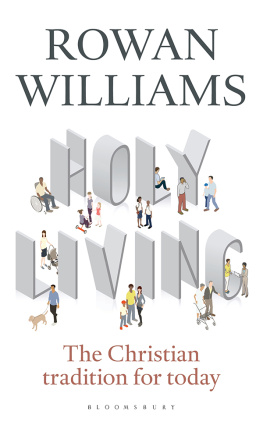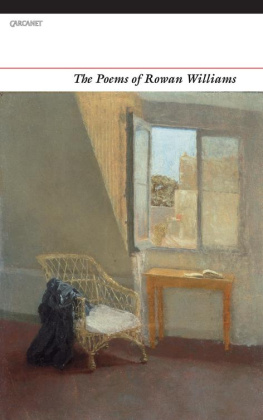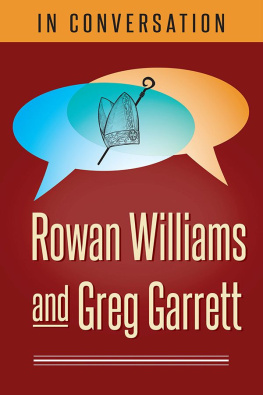Rowan Williams - Meeting God in Paul
Here you can read online Rowan Williams - Meeting God in Paul full text of the book (entire story) in english for free. Download pdf and epub, get meaning, cover and reviews about this ebook. year: 2015, publisher: SPCK, genre: Religion. Description of the work, (preface) as well as reviews are available. Best literature library LitArk.com created for fans of good reading and offers a wide selection of genres:
Romance novel
Science fiction
Adventure
Detective
Science
History
Home and family
Prose
Art
Politics
Computer
Non-fiction
Religion
Business
Children
Humor
Choose a favorite category and find really read worthwhile books. Enjoy immersion in the world of imagination, feel the emotions of the characters or learn something new for yourself, make an fascinating discovery.

- Book:Meeting God in Paul
- Author:
- Publisher:SPCK
- Genre:
- Year:2015
- Rating:3 / 5
- Favourites:Add to favourites
- Your mark:
- 60
- 1
- 2
- 3
- 4
- 5
Meeting God in Paul: summary, description and annotation
We offer to read an annotation, description, summary or preface (depends on what the author of the book "Meeting God in Paul" wrote himself). If you haven't found the necessary information about the book — write in the comments, we will try to find it.
Meeting God in Paul — read online for free the complete book (whole text) full work
Below is the text of the book, divided by pages. System saving the place of the last page read, allows you to conveniently read the book "Meeting God in Paul" online for free, without having to search again every time where you left off. Put a bookmark, and you can go to the page where you finished reading at any time.
Font size:
Interval:
Bookmark:
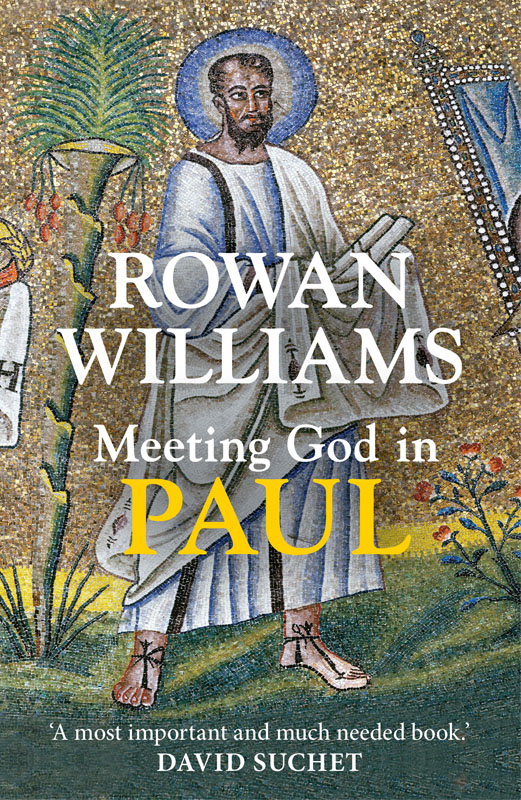
Vintage Williams an antidote for anyone who has ever struggled with Paul himself or with large, complicated books about the apostle! Three beautifully written chapters explain clearly the social world of the man himself, his disturbing idea of the universal welcome in Christ, and his understanding of the new creation brought about through the death and resurrection of Jesus. This simple but profound introduction to Paul will be helpful at any time of year, but the final questions and Bible studies for reflection will greatly assist those wishing to read it during Lent.
The Revd Canon Professor Richard A. Burridge Dean of Kings College, London
There are two forms of simplicity. First, there is a certain naive not knowing that is yet to encounter the difficulty and challenge of a subject; and then there is another deeply felt knowing that sits on the other side of complexity and is only arrived at after much searching and reflection. Here, a subject is known so well that it has become part of the person who tells it. This deceptively simple little book is a wonderful example of this sort of knowing. Rowan Williams seems to have arrived at a point where a lifetimes learning and praying is distilled into profound simplicity.
The Rt Revd Stephen Cottrell, Bishop of Chelmsford
In Meeting God in Paul , Rowan Williams explains how Paul moved from being the leader of an anti-Christian terrorist squad to being all-consumed by his contemporary, Jesus, who becomes for Paul the image of the invisible God. This is a most important and much needed book. It releases St Paul from the box of popular misconception and introduces us to Paul as a powerful evangelist who welcomes all who want to follow Christ, and wishes to bar none.
David Suchet, actor and presenter of the BBC TV series In the Footsteps of St Paul
Many people find the complexity of Pauls character a barrier to understanding his writings. Here, Rowan Williams helps us to see that see that Pauls complexity is a gift; that his writings are deep and difficult because we are deep and difficult, and they touch us because they speak to our basic humanity.
Angela Tilby, Diocesan Canon, Christ Church, Oxford and regular contributor to BBC Radio 4s Thought for the Day
Born in 1950, Rowan Williams was educated in Swansea (Wales) and Cambridge. He studied for his theology doctorate in Oxford, after which he taught theology in a seminary near Leeds. From 1977 until 1986, he was engaged in academic and parish work in Cambridge, before returning to Oxford as Lady Margaret Professor of Divinity. In 1990 he became a fellow of the British Academy.
In 1992 Professor Williams became Bishop of Monmouth, and in 1999 he was elected as Archbishop of Wales. He became Archbishop of Canterbury in late 2002 with ten years experience as a diocesan bishop and three as a primate in the Anglican Communion. As archbishop, his main responsibilities were pastoral whether leading his own diocese of Canterbury and the Church of England, or guiding the Anglican Communion worldwide. At the end of 2012, after ten years as archbishop, he stepped down and moved to a new role as Master of Magdalene College, Cambridge.
Professor Williams is acknowledged internationally as an outstanding theological writer and teacher as well as an accomplished poet and translator. His interests include music, fiction and languages.

First published in Great Britain in 2015
Society for Promoting Christian Knowledge
36 Causton Street
London SW1P 4ST
www.spckpublishing.co.uk
Copyright Rowan Williams 2015
All rights reserved. No part of this book may be reproduced or transmitted in any form or by any means, electronic or mechanical, including photocopying, recording, or by any information storage and retrieval system, without permission in writing from the publisher.
SPCK does not necessarily endorse the individual views contained in its publications.
Unless otherwise noted, Scripture quotations are the authors own translation.
Every effort has been made to seek permission to use copyright material reproduced in this book. The publisher apologizes for those cases where permission might not have been sought and, if notified, will formally seek permission at the earliest opportunity.
British Library Cataloguing-in-Publication Data
A catalogue record for this book is available from the British Library
ISBN 9780281073382
eBook ISBN 9780281073399
Typeset and eBook by Graphicraft Limited, Hong Kong
Contents
Trying to write a very short book about St Paul feels a bit risky: from the early centuries of the Christian Church until now, the great minds of Christianity have worked out their thoughts in lengthy and impassioned dialogue with Pauls letters, and the quantity and quality of their reflection is a reminder of just how much there is to discover in these unique documents. My dear friend and former colleague, Tom Wright, has recently produced a magisterial study of Paul, practically every one of whose nearly 1,700 eloquent pages contains some fresh and challenging insight requiring more thought and exploration from the reader. Can anything useful be achieved in a few brief chapters?
The only excuse for a brief study like this is that Pauls world remains a closed book for so many regular churchgoers never mind the numerous others who hear Pauls name and are distantly aware that he was important at the beginnings of Christianity. Both believers and non-believers are quite likely to have picked up a set of assumptions about Paul that he had a problem about womens role in the Church, that he was against sex in general and homosexuality in particular, that he supported slavery, that he changed the simple teaching of Jesus into a complicated philosophy or mythology, and so on. There are plenty of good twenty-first-century reasons, it seems, to write him off.
But in fact these half-understood assumptions obscure nearly everything of what makes Paul really interesting and exciting. I believe that we need to read Paul with a sense of his own intense conviction that he was exploring a new country as fertile, beautiful and exhilarating, above all as real and tangible in its working, as any that a sixteenth-century sailor might have run across in his voyages of discovery. Did Paul transform Christianity? Yes, of course. He took a bundle of traditions and practices generated by the mysterious events around and after Jesus death and struggled, with all the intellectual and imaginative skill he could muster, to see the patterns that held them together. But the more you read him, the more you see how he is labouring to do justice to something that is already there confronting him in these stories and practices not improvising a new religious system. Sometimes there are still loose ends in his attempts to bring it all together in a consistent pattern; more often he uncovers a set of interconnections so profound that they have set the agenda for centuries of further discussion and elaboration. He is never looking for new religious theories for their own sake; he is always asking what must be true about God, about Jesus, about the human and the non-human world, if the prayer and practice of the early Christians he knew is to make some kind of sense, to them as well as to their baffled or suspicious neighbours.
And to grasp how this works, we need to have at least some sense also of the social world and the world of ideas Paul inhabits. He will take for granted things we dont think about; he will, at the same time, challenge things that everyone else in his era took for granted. It helps to have some feeling for this, otherwise we shall miss the moments when he is being most courageous and creative, when the dangerous newness of what has happened because of Jesus most clearly comes through for him.
Font size:
Interval:
Bookmark:
Similar books «Meeting God in Paul»
Look at similar books to Meeting God in Paul. We have selected literature similar in name and meaning in the hope of providing readers with more options to find new, interesting, not yet read works.
Discussion, reviews of the book Meeting God in Paul and just readers' own opinions. Leave your comments, write what you think about the work, its meaning or the main characters. Specify what exactly you liked and what you didn't like, and why you think so.

